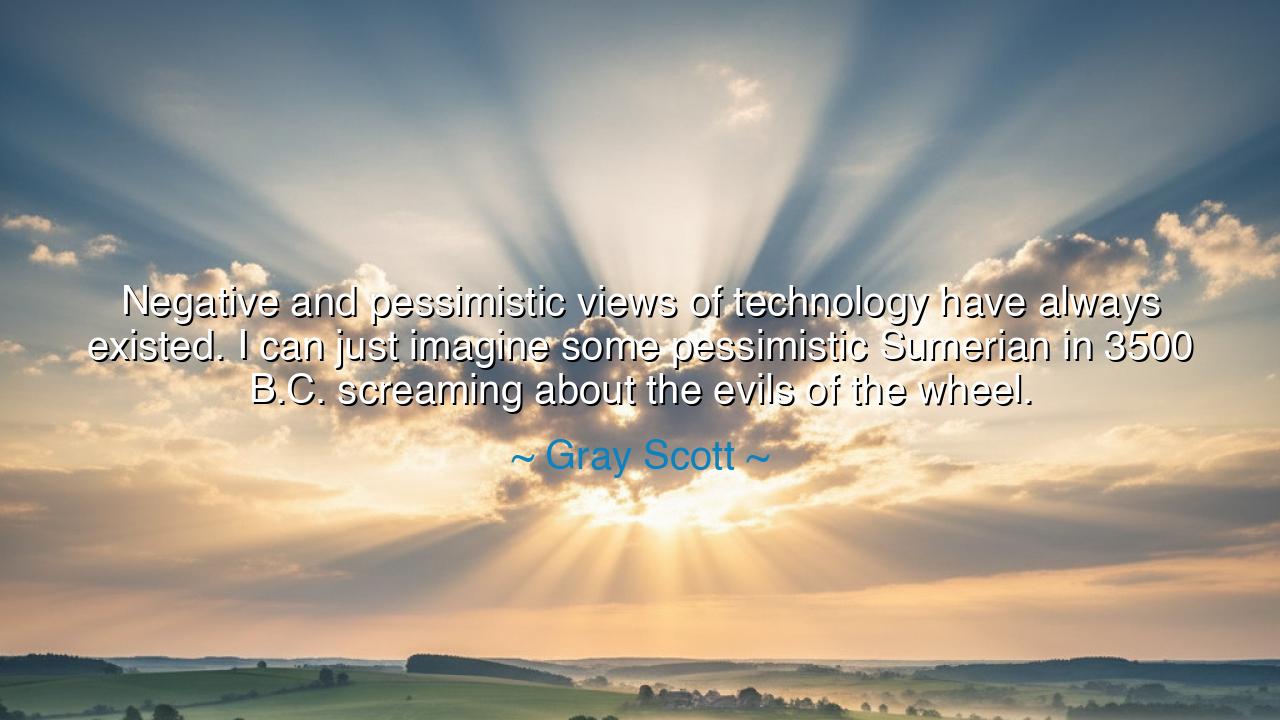
Negative and pessimistic views of technology have always
Negative and pessimistic views of technology have always existed. I can just imagine some pessimistic Sumerian in 3500 B.C. screaming about the evils of the wheel.






The words of Gray Scott—“Negative and pessimistic views of technology have always existed. I can just imagine some pessimistic Sumerian in 3500 B.C. screaming about the evils of the wheel”—carry both humor and timeless wisdom. At their heart, they reveal a truth as old as invention itself: whenever mankind creates something new, there are always voices of fear, doubt, and resistance. The wheel, one of the greatest breakthroughs in human history, may seem so obvious to us now that we cannot imagine life without it. Yet in its time, it must have provoked unease—those who wondered if it would disrupt tradition, challenge order, or bring unforeseen dangers. Thus, Scott reminds us that skepticism toward technology is nothing new; it is the echo of fear that has followed every step of human progress.
The origin of this idea is found in the tension between human creativity and human caution. Every invention—whether fire, the wheel, the printing press, electricity, or the computer—has been met with both awe and suspicion. When fire was first tamed, some surely feared it would bring destruction, and indeed it could. When Gutenberg’s press spread books across Europe, there were those who warned it would unleash heresy and chaos, and in a sense, it did—yet it also unleashed freedom and enlightenment. Fear has always shadowed progress, for every tool carries both power and risk.
Consider the story of Socrates, who, as recorded by Plato, distrusted the written word itself. He feared that writing would weaken memory, that people would cease to truly learn if they relied on words etched in scrolls. In his eyes, this new “technology” was dangerous. And yet, were it not for writing, we would not even know of his wisdom today. Here lies Scott’s point: even the greatest minds have sometimes doubted the very innovations that allowed their legacies to endure.
We see the same pattern in more recent times. When electricity began to light the cities, there were those who called it unnatural, fearing it would corrupt health and defy divine order. When the first automobiles rattled down the road, critics sneered at their noise and danger, certain they were a passing folly. When computers first appeared in offices and homes, many declared they would destroy social life, work, and even the human mind. Each time, voices of pessimism rose. And yet, each time, humanity found a way to turn the tool into a servant of progress rather than its master.
But Scott’s words also contain a warning wrapped in wit. For while fear of technology is ancient, so too are the dangers of ignoring it blindly. The Sumerian who feared the wheel was not entirely wrong—for the wheel made possible the chariot of war as much as the cart of trade. The printing press spread knowledge but also propaganda. The internet has united billions but also unleashed misinformation. Thus, the lesson is not to silence all pessimism, but to temper it with balance: to neither worship technology as savior nor reject it as curse, but to wield it wisely.
The lesson for us, then, is to recognize the eternal pattern. There will always be doubters, always those who cry doom at each new invention. Do not let such voices paralyze you. Instead, study carefully, weigh the risks, and embrace the possibilities. Progress comes not to those who tremble at every tool, but to those who master them. Let us not be the “pessimistic Sumerians” of our own age, cursing the digital wheel, but rather the builders who use it to carry humanity further than ever before.
In practice, this means approaching new technologies—artificial intelligence, biotechnology, renewable energy—with open minds and cautious hearts. Seek to understand before you condemn, to guide before you fear. Ask not, “What evil will this bring?” but also, “What good can we draw from it?” For history has shown that every tool is a double-edged blade, but in the hands of wisdom, it becomes a plow that feeds nations rather than a sword that destroys them.
So let Scott’s words echo in our memory: pessimism has always shadowed invention, even in the days of the wheel. Do not be the voice that only screams of doom. Be the one who learns, who adapts, who guides. For the march of human creativity cannot be stopped—it can only be shaped. And if we shape it with courage and wisdom, technology will not be our curse, but our chariot to new horizons.






AAdministratorAdministrator
Welcome, honored guests. Please leave a comment, we will respond soon